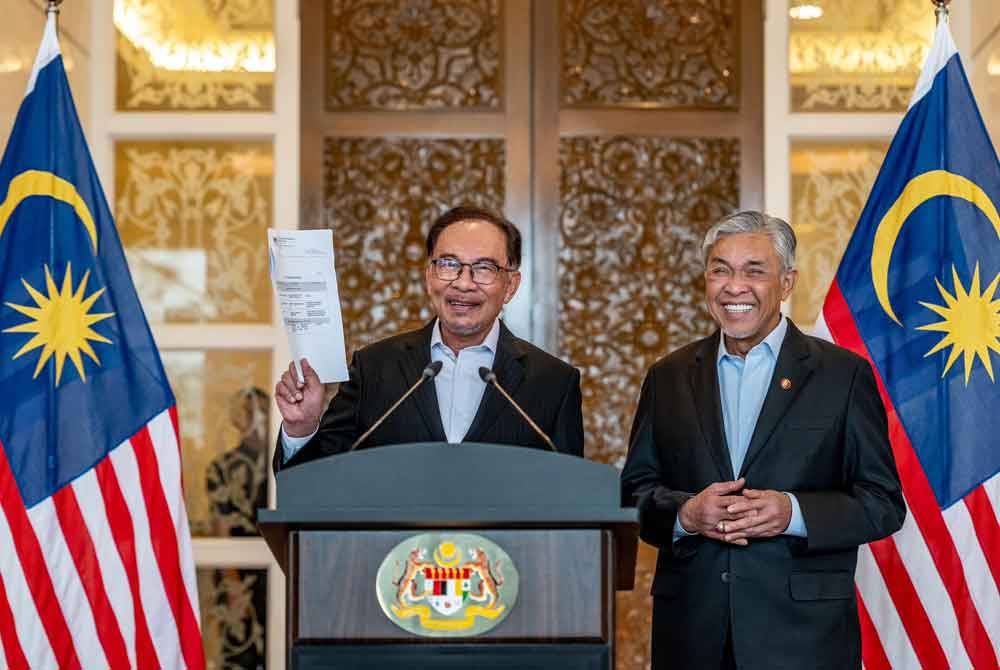Madani shakeup: Party dynamics at play - Analyst

SHAH ALAM - After over five months of Cabinet reshuffle speculations in the Unity Government, Prime Minister Datuk Seri Anwar Ibrahim has finally executed the anticipated changes in conjunction with the celebration of one year of the Madani Government's administration.
In line with the predictions of many political observers, the Pakatan Harapan (PH) Chairman undertook a significant realignment of the Cabinet lineup, appointing five new ministers and removing one.
The recent Cabinet reshuffle also seen the creation of four new ministries.
These four ministries emerged as divisions from the previously unified Natural Resources, Environment, and Climate Change Ministry (NRECC) and the Communications and Digital Ministry.
NRECC was divided into the Energy Transition and Public Utilisation Ministry, now held by Deputy Prime Minister II Datuk Seri Fadillah Yusof, and the Natural Resources and Environmental Sustainability Ministry, still led by PKR vice-president, Nik Nazmi Nik Ahmad.
The Communications and Digital Ministry was similarly split, with the Communications Ministry retained by PKR information chief Fahmi Fadzil, while the Digital Ministry is now headed by the Selangor DAP chairman, Gobind Singh Deo.
Explicitly, the implementation of this Cabinet reshuffle is considered timely.
At a time when the Unity Government faces significant challenges in addressing the economic crisis and the increasing cost of living for the people, Anwar, along with his ministers, is also grappling with the dilemma of dwindling support from Malay voters post the 15th General Election (GE15).
Recognising the need for Anwar to focus entirely on the task of governing the nation, many political analysts commend his decision to create two crucial portfolios that were previously under his purview: Finance Minister II and Federal Territories Minister.
Five former ministers brought in
Anwar's strategy of bringing back five former ministers from both PH and Barisan Nasional (BN) was considered a significant move to inject experience into the government administration.
These five prominent leaders are Umno vice-president Datuk Seri Johari Ghani (Plantation and Commodities Minister); Parti Amanah Negara (Amanah) Strategy Director Datuk Seri Dr Dzulkefly Ahmad (Health Minister); DAP vice-president Gobind Singh Deo (Digital Minister); Umno Women's chief Datuk Seri Noraini Ahmad (Women, Family, and Community Development Deputy Minister); and DAP Deputy Chairman M. Kulasegaran (Deputy Minister Prime Minister's Department (Law and Institutional Reform)).
With the expansion of the Madani Government Cabinet, the number of ministers and deputy ministers has increased to 60, compared to 55 previously.
It is not an exaggeration to say that this lineup is considered Anwar's best combination and formula to form a strong administrative team.
However, Anwar's implicit agenda in this Cabinet reshuffle continues to raise various questions, as several surprising decisions have been made.
Among them is the move to change several ministry portfolios involving ministers from both BN and PH, even though some of them are considered to have demonstrated outstanding performance in their previous ministries.
"For me, the most surprising portfolio change among Umno-BN Ministers involves BN vice-president Datuk Seri Mohamad Hasan.
As the number two leader of BN, it raises questions as to why he was moved from the more prominent Defence Ministry to the Foreign Ministry.
All BN ministers' performances are good and do not create conflicts.
With Umno vice-president Datuk Seri Mohamed Khaled Nordin given a more significant role in the Defence Ministry, speculation arises as to whether this reshuffle is an opportunity to strengthen the position of certain leaders within the party?" commented Ilham Centre Executive Director Hisommuddin Bakar.
Hisommuddin said a similar situation appears to occur with PKR, led by Anwar himself, through this Cabinet reshuffle.
This is because there are ministers who have gained Anwar's trust but face criticism from the people, such as the Education Minister Fadhlina Sidek and Fahmi, who were retained.
However, the move to change the ministry portfolios held by former Health Minister Dr Zaliha Mustafa and Johor Bahru MP Akmal Nasrullah Mohd Nasir to less significant ministries, along with the reduction of Nik Nazmi's portfolio, suggests an effort to diminish the influence of PKR deputy president, Rafizi Ramli, within the government.
"Perhaps PKR will deny having two factions, but when there is a reshuffle of portfolios involving ministers considered pro-Rafizi, it indicates that there is a party effort to downplay the role of Rafizi's faction in the government," said Hisommuddin.
"Minor realignment"
Meanwhile, University of Tasmania Asian Studies director Professor Dr James Chin was not particularly excited about the announcement of Anwar's new Cabinet lineup.
Describing this Cabinet reshuffle as merely "minor realignment," Chin believed that Anwar missed the golden opportunity to carry out a significant realignment of the Cabinet lineup that would have a truly substantial impact.
"The only good thing Anwar did in this reshuffle is to appoint Bukit Mertajam MP Steven Sim as the Human Resources Minister to address various crises and corruption issues surrounding the ministry.
"For me, this is a missed opportunity by the PM to appoint someone who is truly ideal.
"Certainly, this Cabinet reshuffle is just a mini realignment to avoid worsening relations between the parties in the Unity Government, with the positions of ministers from Sabah and Sarawak left untouched," he said.
In the meantime, DAP veteran Charles Santiago considered the reappointment of Dr Dzulkefly as the Health Minister and the appointment of the new Human Resources Minister as the right decision by the PM.
He also rejected the assumption that the appointment of more DAP ministers in this reshuffle signalled the growing dominance of the party in the Unity Government.
"I don't think there is a significant difference in the number of appointments of DAP ministers and deputy ministers.
"Yes, there has been an addition, but it is not significant.
"However, this time, I see Anwar making a slight addition of Cabinet positions to DAP because he believes that the perception of Malay voters being less comfortable with us has been eroding day by day," said the National Water Services Commission (Span) chairman.















